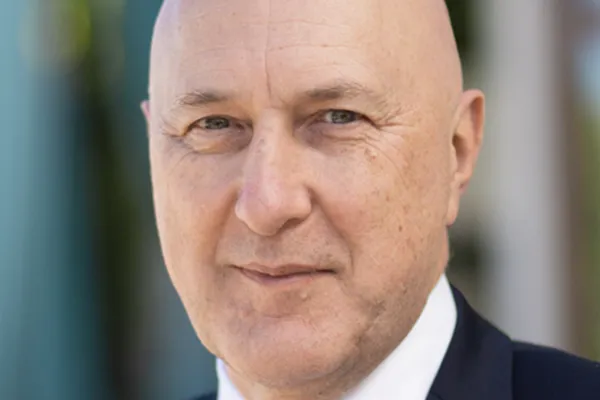If the Internet was indeed "going to change everything," then phone calls were going to change, too.
That, in essence, was the dot-com-era thinking behind Net2Phone, a company set up in 1995 by long-distance company IDT Corp. to take on conventional phone companies by converting voice calls into digital packets that could be routed over the Internet at a far lower cost.
Never overestimate the power of a good idea whose time hasn't come: Net2-Phone, as it turned out, was about eight years ahead of the market.
The Newark, New Jersey, start-up was one of the first to exploit the Voice over Internet Protocol, or VoIP. At first it appealed mainly to technophiles who relished the challenge of reprogramming their personal computers to serve as surrogate telephones. "We invented the idea of PC-to-PC calling," boasts Stephen Greenberg, an original Net2Phone director and its CEO since October 2001.
Despite this technological wizardry, customers were scarce. No matter. The Internet boom was in full swing, and the technology was making gains, even if Net2Phone wasn't. VoIP was not just for PC calls: By 1999 technologists had begun to see it as an alternative method of delivering phone services to corporations and to developing countries eager to modernize their communications.
That was reason enough for Net2-Phone to float 12 percent of its shares in a July 1999 IPO, raising $80 million. Just five months later it put an additional 12 percent on the block, bringing in $346 million.
With cash to burn, Net2Phone spent heavily on advertising, and its calling-card business skyrocketed. Sales more than doubled, to $72 million, in the fiscal year beginning in August 1999 -- but operating losses soared more than tenfold, to $80 million.
In spite of the losses, in March 2000, AT&T Corp. plunked down $1.4 billion for a 32 percent stake but ended up selling much of it to cable giant Liberty Media Corp. the next year, after the value of the shares plunged 95 percent.
"Our stock traded as high as $90 shortly after the IPO [which was at $15], but we'd never made a penny," recalls Greenberg, 59, who founded Roseland, New Jersey, law firm Stern & Greenberg before IDT chairman Howard Jonas recruited him to Net2Phone.
Not until its fiscal 2003, ending last July, did Net2Phone turn an annual profit: $17 million on $92 million in sales. The stock, which had traded as low as $1.80 in October 2002, bounced up to $4.05 at year-end 2002, $6.80 a year later and $7 in late January, giving Net2Phone a current market cap of $525 million.
What's changed? For a start, the company is profitable entirely on the basis of its core business of selling VoIP calling services to consumers and businesses. With that as its foundation, Net2Phone is looking for future growth in the emerging market of cable telephony: providing VoIP facilities to cable television system operators competing against traditional telephone carriers.
As it is, 135,000 U.S. consumers now use Internet phone services, according to Scottsdale, Arizonabased research firm In-Stat/MDR. The majority are customers not of Net2Phone but of Vonage, a privately held Edison, New Jersey, company that markets calling plans directly to households. By contrast, Net2Phone aims to outsource or franchise its VoIP capability to cable operators.
"That's where the buzz is, and it's what investors are excited about," says Greenberg of Net2Phone's cable phone subsidiary. That helps to explain why Net2Phone was able to raise $63 million in a secondary stock offering in November.
Eric Buck, head of research at Janco Partners, a telecommunications-focused investment bank in Greenwood Village, Colorado, rates Net2Phone a buy, with an $11 price target, about $2 higher than the consensus. Buck estimates that at least 950,000 cable TV homes in the U.S. and overseas will be using Net2Phone's VoIP services by 2008, generating $250 million in revenue.
Says Greenberg, "We've been doing VoIP longer than anybody, and this is going to be a breakout business."
The CEO discussed Net2Phone's strategy in a recent interview with Institutional Investor Assistant Managing Editor Jeffrey Kutler.
Institutional Investor: How did a lawyer become head of a high-tech company?
Greenberg: I was Net2Phone's legal counsel from its inception in 1995. After we closed AT&T's investment in August 2000, Howard Jonas, who founded Net2Phone and is still chairman, convinced me to become president. In October 2001, Howard's company, IDT, and Liberty Media formed NTOP Holdings to manage their joint interest in the company. At that point I became vice chairman and CEO.
How did you survive the tech bubble?
We had to become more focused. For example, prepaid phone cards, a high- revenue, low-margin business, accounted for 27 percent of our revenues in 2001. By the end of this year, we'll be out of that market. At one point we had almost 700 employees; now we have around 280. Throughout the period we had the benefit of committed shareholders and a first-mover advantage with our technology, which we were able to continue developing. Now we're in a position to scale up where we see significant, high-margin growth opportunities.
How has your financial state changed?
When I came in we were burning a lot of cash. Revenues were running at around $160 million. Now our [revenue] run rate is around $90 million, virtually all of that from our VoIP distribution business in 130 countries, which is cash flow positive. In November we completed a secondary offering. Those proceeds plus cash and marketable securities as of the first fiscal quarter [ended October 31] add up to $139 million.
What about structural changes?
Following the secondary offering, NTOP Holdings owns about 42 percent of Net2Phone's stock and 58 percent of the voting rights. Last August we split the operation into two wholly owned subsidiaries: Net2Phone Global Services, which is the core business, and Net2-Phone Cable Telephony. Global Services has turned its first profit; it's a nice, stable complement to Cable Telephony, which is just getting started.
How can you be so sure of cable's prospects?
Look at how quickly leaders like AT&T and Time Warner are getting into VoIP. Cox Communications, a giant cable operator, is already No. 9 in the telephony business. Companies like these recognize that being able to offer voice, video and data transmission is a valuable triple play. Research shows that once you add voice to a TV-Internet package, the customer churn rate drops 50 percent, which is very persuasive if you're trying to fend off competition from DSL [digital subscriber line] and satellite services.
What's your advantage vis-à-vis the likes of Time Warner?
There's no reason we can't be useful to a top-tier cable operator. But our sweet spot will be domestic and international cable operators that lack the technology or the manpower to pull this off by themselves or that are looking for a way to enter the market quickly at minimal capital expense. We offer two service models: hosted, where we run everything and collect a share of the customer revenues; and franchised, in which we buy the rights to provide telepho- ny and keep 100 percent of the revenues.
Does having Liberty Media as a part-owner help the sales effort?
They make introductions to get us in the door. But we have to sell our product based on the merits. One of those introductions, about 20 months ago, was to [Liberty Media subsidiary] Liberty Cablevision of Puerto Rico, which became our first trial and marketing showcase. Voice subscribers in a test phase last year were averaging 1,100 minutes a month, and 30 percent of calls were inbound, indicating they were using cable for their primary phone line. That's an indication of how this business can scale up. Liberty in Puerto Rico passes 310,000 homes and has 120,000 customers.
Does regulation worry you?
We assume there will be some form of regulation. VoIP is on the Federal Communications Commission's agenda, and there are tariffs and universal-access fees that may eventually come in at the state level. But we run models that indicate that even with those fees we're at least 15 to 20 percent cheaper than incumbent phone companies.





